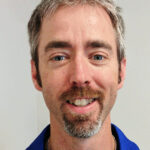
Bishop Thomas Zinkula welcomes participants to the diocesan Synodal Summit June 17 at St. Ambrose University in Davenport.
By Barb Arland-Fye
The Catholic Messenger
DAVENPORT — Catholics carrying banners, the Book of the Gospels and an icon of the most Holy Trinity led a procession into the Rogalski Center of St. Ambrose University for the Diocese of Davenport’s Synodal Summit on June 17.
Enthroning the Book of the Gospels served as a reminder for the gathering of several-hundred people from parishes and schools throughout the diocese that “Christ is the true ‘presider’ of any council or synod. … We gather under Christ’s authority to discern: to listen to what the Word has to say to us; and then we are sent to follow what the Word asks of us” (Synodal Summit booklet).
In his welcoming address, Bishop Thomas Zinkula summarized the universal Synod of Bishops, which Pope Francis commissioned in 2021 and which took the unusual step of seeking input from the laity about the future of the Catholic Church. The Synod began with listening sessions worldwide that addressed three dimensions —communion, participation and mission — and resulted in national, continental and universal reports that the Synod of Bishops will address in October of this year and again next year.
The synodal process, which means journeying together as the people of God, inspired the Davenport Diocese to “continue on with this. Welcoming and belonging is a foundation we can build on,” Bishop Zinkula told the gathering. To move the needle forward in parishes and schools, “there needs to be a greater collaboration among the clergy and laity … to spread the Good News of Jesus Christ together.”
Bishop Zinkula said summit organizers planned three panels “to share thoughts and ideas” of how we can do a better job of welcoming people to our parishes and schools, thereby enabling them to feel a better sense of belonging.”
Promoting teamwork
He encouraged the representatives to assemble a small team to collaborate with their pastors, parish pastoral councils, school principals and school boards in the endeavor. “Be reasonable in what you decide to take on,” the bishop said. The diocese is planning some things in the arena of welcoming and belonging this year that parishes and schools can’t pull off on their own, he added. The process is going to be messy, he advised. “Life is messy. I don’t know where this is going to go. Pope Francis doesn’t know where this is going to go. We need to leave room for the Spirit to lead us.”
Following the bishop’s talk, participants conversed at round tables, sharing personal experiences of welcoming and belonging or lack thereof. A few babies babbled in the background and one little girl playfully ran from her mother. The presence of these few young children acknowledged the reality of participants needing to juggle busy lives with a daylong summit exploring what it means to be a welcoming Church in which the faithful have a sense of belonging.
Parish, school and diocesan leaders shared their insights during panel discussions on communion, participation and mission, followed by Q&A opportunities and table conversations. The Messenger will provide separate articles on each panel in the coming weeks. Here are a few highlights from the panels:
Panel 1: Communion
 “The Church is not a building. It’s about people. We are the Church,” said panelist Colleen Burke of the St. Patrick cluster of five parishes in Clinton County. She spoke about the cluster’s efforts to build relationships among parishioners spread as far as 50 miles apart.
“The Church is not a building. It’s about people. We are the Church,” said panelist Colleen Burke of the St. Patrick cluster of five parishes in Clinton County. She spoke about the cluster’s efforts to build relationships among parishioners spread as far as 50 miles apart.
John Cooper crouched into a baseball fielder’s position. “We need to get into position to play and to welcome others,” said Cooper, pastoral associate and business manager of St. Anthony Parish in Davenport. He said he borrowed an idea on publicly welcoming newcomers during the Mass from Sister Irene Munoz, CHM, who retired last year from multicultural ministry in the Ottumwa area.
Deacon Frank Agnoli, diocesan director of liturgy, painted a portrait of a mythical parish practicing perfect liturgical hospitality. These are some matters he asked the representatives to ponder: “How do we ‘see’ one another when we gather for liturgy? For how we ‘see’ will determine how we act.” The Mass “calls us to conversion.” A Church that sees everyone worthy of inclusion and welcomes each guest is welcoming Christ.
“It all starts with listening,” said Dan Ebener, diocesan director of pastoral planning. He advised the representatives to enter conversations humbly, willing to listen to and learn from someone else. “Once you’ve listened to someone, they want to listen to you.”
Panel 2: Participation
Speaking about the value of small faith groups, Tasha Havercamp said formation of such groups requires “a thousand steps” before they come together. Building a relationship is essential to bringing someone into a small faith group, added Havercamp, director of evangelization and mission for St. Paul the Apostle Parish in Davenport.
Julia Jones, youth minister of St. Ann Parish in Long Grove, reminded the gathering that “youth ministry is the job of every adult in the parish.” That job can be as simple as offering to help the youth minister with transportation to events or bringing treats for youth events or meetings. Empower youth, help them to feel needed in the parish, she said.
Sharon Roling, principal of St. Joseph Catholic School in DeWitt, described how the school community strives to foster an environment that is welcoming and in which students, staff and parents feel like they belong. The school community asks itself, “How do we welcome students every day?” She added, “Smiling is contagious.”

Participants talk during the diocesan Synodal Summit June 17 at St. Ambrose University in Davenport.
Trevor Pullinger, diocesan director of faith formation and catechesis coordinator, spoke about the domestic Church, the household of faith, and encouraged an intergenerational approach adaptive to the whole family. He said families face many challenges. A sense of warmth is essential to faith formation in the family, which is a driving force in passing on the faith.
Panel 3: Mission
St. Ambrose University President Amy Novak spoke in a video message about the university’s commitment to foster a sense of welcoming while also addressing the hurt that students deal with around issues such as divorce, LGBTQ+ and polarization in the Church. “We have to show people they matter before they can feel like they belong.”
Sister Irene Munoz spoke on cultivating unity in multicultural settings and the need to enlarge the tent (a symbol of the Synod) religiously and culturally. Listen to the stories of people who arrived in the U.S. to escape violence, poverty and upheaval in their homelands. Learn some simple words of welcome in that person’s native language. “Sometimes our body language speaks louder than words.”
Father Thom Hennen, diocesan vicar general and pastor of Sacred Heart Cathedral in Davenport, spoke about COURAGE, an apostolate helping same-sex attracted Catholic men and women to lead chaste lives. In his COURAGE ministry he has discovered “a lot of people who are and want to be Catholic and who love the Church and their Catholic faith. …When it comes to this particular ministry and so many other things we’re talking about, we should not feel forced into choosing between truth and love. The truth is ultimately loving. The way truth is expressed is not always loving and that’s what we have to navigate very carefully as a Church.”
Marianne Agnoli, diocesan marriage and family life coordinator, spoke on the topics of ministry to divorced and remarried persons, and ecumenical and interfaith marriages. She advised ministers and pastoral leaders to get educated on these topics and to educate their communities. “There is so much misinformation about what the Church teaches and what the Church allows or doesn’t allow,” she said. Regarding couples in mixed marriages, she advised being intentional about programs and activities that nurture welcoming and belonging.
After the talks and lunch, participants sketched out action plans to take home, including both easier first steps and more challenging areas. The Synodal Summit concluded with prayer and a blessing of water and of the gathering, which sang as its closing song “Companions on the Journey.”
Summit reaction
“The synodal event exceeded my expectations by educating and providing me with information that will help me help my parish to be more vibrant,” said Marty Ryan of St. Patrick Parish in Melrose. “I am excited to go back and share and engage our young people.”
“These were important topics to make sure new people and people who have shied away from the Church feel welcome in our Church,” said Rick Jacoby of St. Mary Parish in Grinnell. He felt all of the speakers were knowledgeable about the topics on which they spoke.
Chris Meyer of the St. Patrick cluster in Clinton County appreciated the big picture approach that the Synodal Summit offered. Sometimes, it is easy to get caught up in the specifics of your parish or parishes’ perspectives. “We’re all in this together. We’ve got to bring everybody back,” she said.
Bishop Zinkula said he was “pleased with and uplifted by the energy of the representatives and others who attended the Synodal Summit, their love of their Catholic faith, and their desire to better welcome people to participate in the life of the Church so they have a greater sense of belonging. Consequently, when I left the summit I had high hopes that this synodal initiative will bear fruit as the representatives develop and put into practice parish and school action plans around the theme of welcoming and belonging.”











